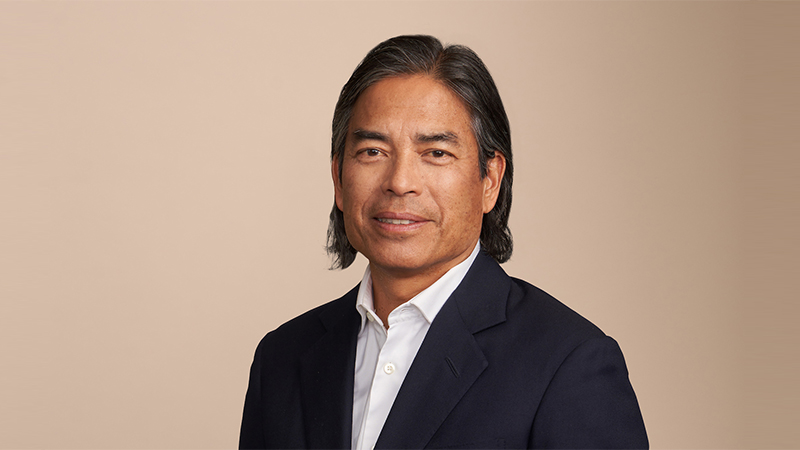The highest-returning IA fund of 2024 was run by a smaller player in European asset management – US-based growth equity boutique Alger.
The Alger Focus Equity fund posted a return over the year of 56.3%, while another of its strategies, the $564m Alger American Asset Growth fund, was up 52.39%.
While surging share prices in Nvidia and other US tech stocks on the back of AI have been among the largest contributors to performance over the last year, the Alger American Asset Growth fund is one of the few actively-managed funds to beat the S&P 500 over a 10-year period.
See also: Yearsley: Financials ‘surprise winner’ of 2024
Speaking to Portfolio Adviser, Alger CEO and CIO Dan Chung says that the firm’s long-term performance is down to a lot more than just holding Nvidia.
Chung is a named manager alongside Dr Ankur Crawford and Patrick Kelly on Alger American Asset Growth, while Crawford and Kelly also run the Alger Focus Equity fund.
“Over a long-term period, its not about a single stock. It’s hundreds of decisions every year, and sometimes the decision is not to sell,” Chung says.
“We were early in Nvidia, buying in 2022. After 2023 saw a spectacular rise in the stock, a lot of people were saying that it must be time to sell, without carefully understanding the fundamentals of the business and how early on we are in the AI revolution. Our biggest and best decision was not to sell any of our Nvidia stock at that time, and it remains a top holding.
“Over the longer term, the success of the strategy has been a relentless focus on the depth and the quality of our team. 60 investment professionals for a firm of our size is actually quite a lot.
“We have a concentration of analysts that is probably 2-3 times more than a lot of our competitors.”
See also: Artemis merges European funds
The firm’s investment approach seeks to benefit from what Chung labels ‘positive dynamic change’. Reviewing the performance of the Alger American Asset Growth strategy over the last 10 years, in which it has posted a 430.8% return (as of 7 January), he says it has been a period of immense change.
“That period started with coming out of the great financial crisis, before entering into the most radical changes in American politics in decades.
“Our relentless focus on our philosophy of positive dynamic change – it means that culturally, as an investment firm, we’re very focused on embracing change. Don’t be afraid of disruption, innovation and volatility. Instead, we look at it as an opportunity to look for the positives that come out of these changes.
“The world is changing faster. There is more innovation and more disruption, which means winners and losers are created faster than they were in the past.
“It’s a highly competitive game. It requires people, but it also requires that right philosophy and mindset.”
European growth
The New York-based boutique is a growth equity specialist, and though it is better known back at home, the firm is looking to expand its offerings in Europe.
“We only have about 5% of our clients internationally — we have a two-person office here in London and a one-person office in Singapore, and we’re trying to grow in both regions.”
“We have been interested in talking with European asset managers in a similar situation, whether we can partner to help them grow in the US, and help Alger grow over here.
“There are some very obvious advantages for a European asset manager to consider partnering with a firm like Alger. We can offer significant US distribution. I’ve met many firms here that are actually quite large and don’t really have any US distribution, and we don’t have significant European distribution. The opportunity is pretty large.”
Industry M&A
The firm, founded in 1964 by Fred Alger, recently celebrated its 60th anniversary.
Industry M&A has seen many boutique firms in both the US and Europe swallowed up by larger asset managers.
However, Chung says that this trend has led to the unique selling points of larger asset managers becoming distorted, which can be exploited by existing boutiques.
“We’ve been taking advantage of the industry structure right now. In traditional asset management, you have a few global giants, and then you have a lot of very big companies just outside of the top 10.
“A lot of them have been created out of multiple mergers. The challenge there is that they don’t have the distribution scale of the largest names, and because they’ve been created out of mergers, a lot of them are like supermarkets. They offer everything, but they’ve lost a little bit of what they are best at.
“They all originally had something that they were really good at, whether it was bonds, equities or real estate, but now that they’ve become these large ‘supermarkets’ – they’re trying to compete with the Costco’s and the Tesco’s.
“They have a lot of challenges because it’s hard for them to grow as they’re large already. Their cultures are just within the team of the investing, and they’re not necessarily particularly known to be particularly at any one thing.”









